Narrative, Steemit, and the Influence of Power
In A Tale of Two Cities, the great Charles Dickens tells of the struggle against aristocracy in two of the most powerful kingdoms of the 18th century. Set before and during the French Revolution, it delves into some of the most important themes of the day, such as justice, poverty, redemption, love, and the abuse of power. These are befitting themes to revisit in the nascent age of blockchains and algorithmic governance.
As it were, I've used my Steemit platform in part to promote the up-and-coming blockchain-based social media platform Narrative, not so much because I hope it replaces Steemit (which I don't), but more so because I think there's room for another player in this space and I think Narrative has some potential. It is not perfect, however, and I recently got to witness what I think is one of its budding weaknesses.
I'll preface the below analysis by stating that I don't believe there is any social media platform that can be all things to all people. As ubiquitous as #Facebook is, some of us use it not because we like it but because we realize that's where the bulk of the human race currently spends it frittering time, and not to fritter with the masses makes one, in essence, a social outcast at best and a techno-pariah at worst. As anti-social as I am, even I can see that.
Nevertheless, we humans love communities, whether we fit into them or not. We're wired to exist in community, and so wherever community is possible, there you will find us trying to make the best of it. This analysis is my trying to make the best of it.

The Narrative Aristocracy and the Struggle for a Niche
The notoriously effervescent @quillfire requested that I explain the difference between being a Niche owner and a Niche moderator at Narrative. This seems like a good place to do that. But I'll do you one better and discuss the chain of hierarchy at Narrative as well as its pros and cons.
Let's start with the basics. When you first join Narrative you are nothing more than a new user, a "Narrator" to use the native lingo. It's pretty simple. Just like anywhere you might be the new face, you know nothing, you know no one, and you feel as awkward as a teenage boy at his first dance party. However, the Narrative platform is real quick to encourage new users to suggest a Niche, and many do. Of course, what costs little will be valued little, and it costs nothing to suggest a Niche.

Image from Pixabay.
Niches at Narrative are like spokes on a wheel. Few people pay attention to spokes on a bicycle wheel, yet they quietly and unassumingly perform the very important job of holding the wheel together and transferring the power from the hub of the wheel to the rim so that the wheel spins and the bicycle is propelled. This article does a much better job at explaining it than I can.
At Narrative, Niches allow members on the platform with similar interests to congregate in one place. They also allow members to tag their personal journal entries in such a way that they are more easily found and more widely distributed to people who share those interests. Each personal journal entry is allowed up to three Niche tags. Unfortunately, Niches that have no ownership cannot be tagged because they are not active.
That brings me to the topic of Niche ownership. Once a Niche is approved (I'll cover this process in a jiffy), it then goes up for auction. This process seems straightforward. When a Niche is suggested it goes into auction and members of the Narrative community vote on it. If it's approved, it is auctioned for ownership. If not, it's rejected.
Niche Auctions and Owners
 Image from Pixabay
Image from Pixabay This is one of those things that seems somewhat arbitrary to me. As of this writing, there are 2,592 approved Niches, but only 745 Niches are owned by 304 Niche owners. And, I'll add, a Niche owner doesn't technically own the Niche. When you win an auction and agree to be a Niche owner, you are effectively leasing the Niche for one year. And you can abandon the Niche at any time by bowing out and putting it back up on the auction block (but why would you?).
Niche auction winners have 72 hours to pay or they lose the Niche. This is how I ended up with the Speculative Fiction Niche, which I suggested as a new member. Another new member joined and immediately bid on the Niche, won the auction, then failed to pay. So I bought the Niche instead. After a year, Niche owners can renew their lease or put the Niche back on auction. Renewal is $75 USD in NRVE or 20% of the previous year's earnings, whichever is greater.
When a Niche is bought and paid for initially, whoever suggested that Niche gets a 10% commission on the sale price in NRVE. If you suggest a Niche and then win the auction, you effectively get a discount. I didn't realize that until researching this article.
A Niche owner has one responsibility: Promote the Niche. In return, they receive 10% of the rewards earned from that Niche, which are distributed monthly.
Niche Moderators
Niche moderators are important positions. They review the content in a Niche, approve or reject content based on community standards, review comments, and have the power to ban users for bad behavior. It's the equivalent of moderating a Facebook group.
You would think that Niche owners have the right to appoint moderators, but that would incorrect. Niche moderators are elected by the community. Each Niche can have up to two moderators. Owners can also be moderators, but they have to be nominated (you can nominate yourself) and elected by the community.
As it were, the Speculative Fiction Niche I own is currently undergoing a moderator election. There are currently two candidates vying for the position (I am one of them), but there is room for more.
The Tribunal
The Tribunal is the governing body of Narrative. We can all take solace in the fact that it isn't a monarchy. However, during the Alpha phase (now), The Tribunal is made up of Narrative staff and founders. After Beta launch, there will be an annual election (starting in September 2019) to elect up to 15 Narrators for these positions.
The name itself sounds capricious, as if The Tribunal is some self-appointed judiciary with absolute power.

Image on Pixabay.
In effect, it does have absolute power over all governance issues regarding content, channels, and users. While there is no check against its powers, Narrative has built in limitations on individual Narrator influence. For instance, terms are for one year, and no Narrator can serve for more than 10 years during their lifetime. In my opinion, that's too long. I'd limit terms to no more than two consecutive and no more than six years in a lifetime.
One important decision The Tribunal makes is whether or not a Niche is approved based on its uniqueness and other factors as designed by the Narrative Specifications. The problem with this is that Narrators may be placed in a position to make decisions on matters about which they have no knowledge or experience. And I'm of the opinion that a decision is only as good as the information on which it is based.
The Fight Over a Fiction Niche: Micro, Flash, and Arbitrary Influence
Now that I've provided the lay of the land, let me relay the specifics of an incident I recently witnessed. @felt.buzz recently clicked on one of my Narrative links and joined the platform. He immediately recommended a Niche - Micro Fiction. His definition for this Niche seemed reasonable to me:
Very short stories - anything from 140 characters to 250 words.
That's not exactly how I'd have done it, but it wasn't my Niche or my suggestion, so who am I to say it's wrong?
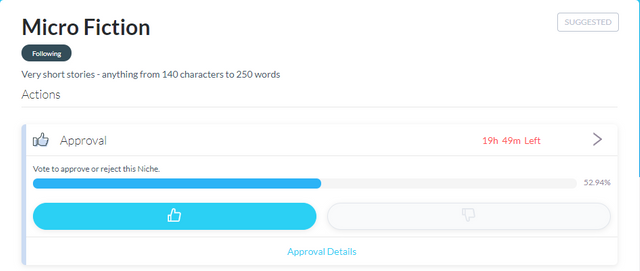
What happened next seems a bit ridiculous and could have been avoided with better guidelines for Narrators on Niche approval. Because there was already an approved Niche for Flash Fiction similar to the above description for Micro Fiction, a few Narrators downvoted the suggestion for Micro Fiction. As of this writing, voting for the Niche suggestion is still 19 hours from ending. It will no doubt fail.
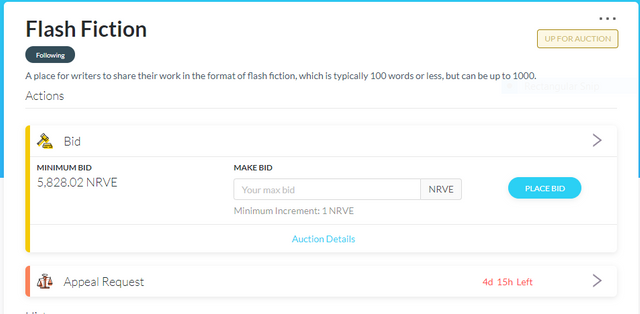
As you can see from the above screenshot, the Flash Fiction Niche has been approved and is up for auction--for the second time. During the first auction, the individual who suggested the Niche won the bid, but since there were no other bidders and that individual failed to pay, it went back to auction.
Meanwhile, I wrote a post on Narrative's forum explaining the situation and noting how this could cause issues (others had already addressed the anomaly). Then I filed an appeal to The Tribunal on the definition of Flash Fiction as stated for the Niche that now hangs in limbo.
As a side note, the definitions of microfiction and flash fiction continue to be debated among fiction writers and publishers. Microfiction is generally considered a subcategory of flash fiction, which is generally defined as fiction up to 1,500 words or, depending on the publisher, 1,000 words. Microfiction is generally defined as anything shorter than 300 words. Again, definitions vary among publishers.
Interestingly, after my forum post, another Narrator suggested another Niche named Microfiction and gave it this definition:
Microfiction is any story told in 300 words or less - even as short as a few words. An example is the apocryphal story attributed to Hemingway: "For sale: baby shoes, never worn." Pack a punch in as few words as possible. Not as easy as it seems!
Now, why would this individual do that, as opposed to appealing the originally suggested Niche to The Tribunal? Simply put, because when a Niche is purchased at auction, the person who suggested it gets 10% of the sale. How's that for incentive?
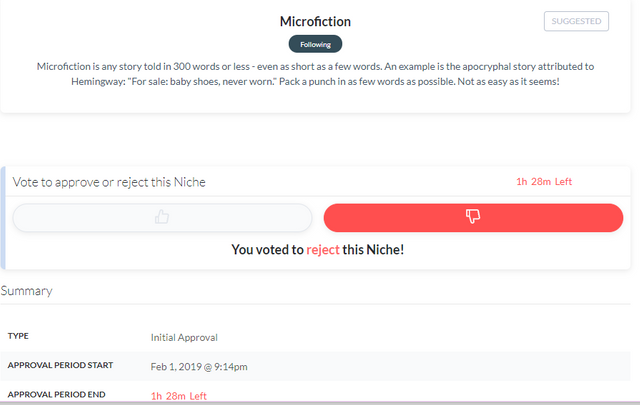
With slightly less than an hour-and-a-half left for voting, as of this writing, I'm afraid this Niche suggestion will pass. I had originally voted for it. Upon closer scrutiny, and after reading the ground rules again, I changed my vote. Immediately, the approval rating dropped from 100% to 97.06%.
The original Micro Fiction Niche sits at just over 50% approval. I'm quite certain Narrator reputation has a lot to do with vote weight. When this Niche had only three votes against, one of them was a Narrator by the name of Chrstina Gleason, whose reputation is 34.
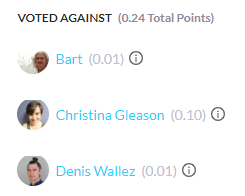
You can see by the above screenshot that the vote against is at .24 points with seven votes. The votes for are at .27 points with a count of 13. Christina Gleason's vote accounts for .10 of the vote weighting, a significant amount compared to the rest.
After changing my vote, Ms. Gleason responded with the following comment:

I'm all for giving people the benefit of the doubt, so I trust that her word is good enough. Still, good intentions does not detract from a bad user experience, and my friend @felt.buzz certainly had that. He left Narrrative pronto with this characterization:
I have to congratulate the owners/designers of this platform for creating the most unwelcoming toxic environment I have ever come across. I can't imagine readers will want to spend much time here, I certainly don't.
I think this is a hasty response, but not undeserved. I would have used the word "hostile" rather than "toxic," but I won't nitpick. I don't mean that the other Narrators were intentionally hostile. They're simply following the ground rules set by the Narrative founders. It's those ground rules that are hostile.
I have no idea who Ms. Gleason is, and I certainly have no axe to grind with her, or with Narrative (I'm still pro-platform). She may very well be a good-hearted woman looking for her good-timing man. But here's what my observations lead me to conclude:
Narrative has set the stage for some to step up and assume a Big Fish-Little Pond posture. I'm all for incentivization and democratic processes (to some extent), but Plato believed pure democracies lead to tyranny. The strength of the U.S. Constitution is that it protects minority rights against the rule of the majority. Narrative's specifications do not, and there lies its most glaring weakness.

Is the Steemit Aristocracy Any Purer?
I've been very open about my criticisms of the Steemit UI. As a result, I refuse to use the Steemit platform to make my posts. I exclusively use eSteem Surfer and SteemPress, jumping back and forth depending on the nature of my posts. But Steemit has other issues, and they're widely known.
Founded on the principle of a meritocracy where excellent content is rewarded and poor content is not, Steemit promises hard-core content creators like me a Nirvana of benefits. But all one has to do to see through that campaign promise is check out the trending page. I learned early on not to rely on the trending page for content suggestions, so I don't.
The trending page is a symptom of the problem, however, and not the problem itself. The real problem is an outgrowth of Steemit's USP (unique selling proposition).
Blockchains are developed with code-based governance systems, which is fine when it comes to rewards distribution and distribution of resources. However, algorithms can't govern human behavior. Therefore, other mechanisms are necessary. Where Narrative attempts to create a democracy ruled by an oligarchy, Steemit has built its platform on the principles of pure libertarianism. Sure, users vote on Witnesses, but there are so many Witnesses, and each user gets so many votes (30) that it can hardly be called a democracy. At best, it is semi-democratic. But I digress.
The problem with Steemit is not its Witness election process. Rather, the problem is its toleration of vote-buying. On the Steemit platform, anyone with the skills can create a votebot. And the owners of these votebots can charge a fee to promise buyers guaranteed rewards based on the strength of the bot's vote. There may not be anything intrinsically wrong with this, but the practice violates the Steemit USP that only the best content gets rewarded.
I've made this argument before, and I'll make it again. Quality is subjective. One man's artistic genius is another man's cesspool of mediocrity. But bots don't care about quality. They care about following the instructions of their creators. The mere presence of votebots violates the alleged meritocracy, no matter how subjective, of the Steemit content economy.
The outgrowth of the presence of votebots is that users can buy votes for inferior content (and it can be inferior by multiple standards of subjectivity). The more STEEM a user has to "invest" in a bot vote, the more the user stands to gain in rewards. And these rewards, sham as they are, are exponential. Keep throwing money at the bot and the bot will continue to grow your rewards pool.
The only redeeming quality of these bots is that they are just as available to true high-quality content creators as they are to mediocre and poor content creators. Except that quality is judged on a bell curve. There will always be fewer exceptional content creators than there are run-of-the mill creators. And the only recourses exceptional content creators have to counter the rise of the gang of mediocrity living off the flesh of voting bots are the downvote and the flag. And these have their own problems.

Image from Pixabay.
I was in a Discord server one day and witnessed some whales discussing one of their Steemit friends who had received some criticism from another Steemian (maybe even a downvote or a flag). The critic, of course, was a Plankton or, at best, a Minnow. Not powerful at all by Steemit standards. These whales (and dolphins) rounded up all their buddies to go and defend one of their own. They organized a flag war on this little fish, and when that little fish apologized for his indiscretion they all removed their flags. I was embarrassed for them. But this is the behavior that Steemit encourages: Bullying. Luckily, this doesn't happen too often on this platform, but it does happen. As a result, the rest of us have to watch our steps or be subjected to battle flags.
The Big Fish-Little Pond Syndrome can develop anywhere. I was booted from a Steemit Discord server with approximately 50 members with no explanation, and when I messaged the moderator to inquire, didn't even get a response. In the spirit of full disclosure, this was early on in my Steemit experience when I was struggling with optimizing my SteemAuto votes, so I halted all voting for a few days to allow my resource credits to recharge. I forgot to restart it after a couple of days and ended up not upvoting member posts for a week. Is that why I was booted? I can only guess, but it could have been discussed and a reasonable solution reached with a little conversation. But why waste time with discussion when you can just exercise your power?
Like the Narrative aristocracy, the Steemit aristocracy is baked into the ground rules of the platform. Unlike the Narrative aristocracy, the Steemit aristocracy is based solely on the value of one's account. If you're a whale, you have power; if you're a Minnow, you don't--unless you align yourself with a swarm of other Minnows.

Tips for Surviving a Blockchain Aristocracy
There is no perfect social media platform. All of them, centralized and decentralized, have their pros and cons. Anywhere you'll find a member of the human race, there you'll find imperfection. For that reason, social media influence is always going to be a struggle for power. Whether you are maneuvering through the capitalist-based Steemit caste system, the democratic oligarchy of Narrative, or something else, the following ground rules should guide us all to a better social experience:
- Read the whitepaper first. Before jumping in, try to get an understanding of the platform, the ground rules, and the value system of its creators.
- Ask a lot of questions. Be humble and ask current users what issues they struggle with.
- Seek first to understand, then to be understood. More experienced users should be kind to new users and tolerant of their lack of knowledge of the platform. New users should respect the knowledge of their forebears.
- Be helpful.
- Discuss issues. Don't be reactionary. If you can't reach a reasonable agreement or consensus, part ways and agree to disagree. Don't let your frustration poison the environment.
- Find ways to improve the social environment you are in. Focus on what you can control, not on what you can't.
- Have fun. Don't make it all about monetary rewards. The love of money is the root of all kinds of evil.
Dividers by @EdibleChthulhu.
UPDATE: The Micro Fiction Niche on Narrative that was suggested by @felt.buzz was approved by a thin margin. There were seven votes against with a .24 point total and 15 votes in favor for a total of .29 points. The Niche was approved with 54.72% of the vote. In an unrelated matter, the FreeWriteHouse Niche suggested by @MarianneWest was also approved with 60.34% of the voters in favor.
Get your weird lit on:
| Garden of Eden | Sulfurings | Deluge |
|---|---|---|
 |  |  |
| At Amazon | At Amazon | At Amazon |

At Amazon

While you're here, check out the backside 5:
- Narrative, Steem Monsters Fan Fiction, and a Steemitblogger's Endorsement
- Exquisite Corpse 2019-1, a Virtuous DPoll, and the Fabulous State of Steem dApps
- 3 Things I Wish To Say This Happy Saturday Evening
- The Evolution of Social Media
- Ups, Downs, and Settlers of Catan

Review Me, Please

Created by @EdibleCthulhu


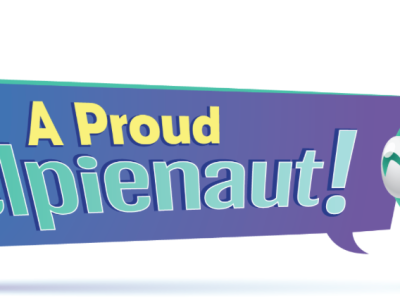
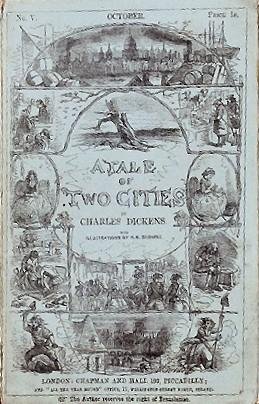
Do you know Our Waylon ?
Ha! That's not Waylon Jennings. So The Netherlands have their own Waylon? Is he Country, or Western?
Yes we have our own Waylon, he i both country and western, he was our Eurovision Contest member and he is a judge on THE VOICE OF HOLLAND
but i think he stole the identity from your Waylon hahahah
Wow what a post!
I sometimes look at my posts and think they could be broken up into individual ones so that I can more easily come up with quality stuff once a day.
This one is definitely like 10 posts in 1 and I can happily say I learned a few things.
Plus, I have memories of HATING Tales of Two Cities when I was forced to read it back in grade 10. So dry and dusty when all I wanted to read was science fiction. ;)
Awesome!
Longer posts get better search engine traction. On Steemit, I also think you can make your mark with long, detailed posts. They work for @quillfire and me. We take a topic and expound on it at length. It leads to a lot of upvotes and engagement. Isn't that what social media is about?
I'm glad you learned a thing or two. That's the point. I hope it pays off.
Ah yes. This is my first foray into blogging and I am constantly working to decide whether a long and involved post is more palatable or a quick hit with a succinct message is best. Kind of like balancing a documentary with awesome 30-second movie clips in order to cater to all walks of blog consumers.
Man. Is my marketing showing? ;)
Anyhow, glad to be studying from the best!
Posted using Partiko iOS
Quill, you're such a dope. :-)
My thoughts on length are much more simple. Google says size matters. Not only does it rank better, but it also converts traffic to dollars better. Neil Patel shows you how to do the math. But if you're writing just to feed the search engines, shame on you.
As @quillfire said, the proper length of an article is no more and no less than the material dictates. I've been writing online since the 1990s, and I've been blogging full-time since 2006. I have over 10,000 blog posts behind me and I've discovered that the key to successful content marketing is to be engaging. Keep it interesting, entertaining, and your audience engaged and they'll burn their dinner reading your content.
Here's something to think about: How long should a fiction story be? Hemingway wrote one in six words - "For sale. Baby shoes. Never worn." A Song of Ice and Fire by George R. R. Martin is seven volumes and over a million words.
How long should yours be? Only you can answer.
I would say get to know your audience. There are folks here who post several times a day. They post shorter posts and do just fine. I post once a day, or sometimes only two or three times a week, and usually post long posts. It depends on your style and your audience.
This is setting new to me as well....a new learning that the lengthy post does count a lot. I have seen many but never realised
Posted using Partiko Android
That is a fascinating article, and could be quite discouraging. I'm not sure how I've survived on Steemit for almost a year now without using votebots, signing on to vote trails, and following the trending page. My family thinks I live in a bubble that hovers a couple of feet above physical reality, but this seems to have worked fine for me.
All I do is blog, and try to be a good community member. I look for people to support who might need it. I find people I admire and support them. I join communities that I believe are worthwhile. I stumble along, hope for the best, and often it happens.
I've met @felt.buzz on here, with his #zapfic, @shaka, with #letsmakeacollage, @f3nix, with #finishthestory, the whole crew at @SteemSTEM, @celfmagazine, @vdux with his haiku. There's you, with #speculativefiction. I could go on, because I'm leaving a lot out that makes Steemit a worthwhile experience for me.
Narrative seems to embody everything I don't like about Steemit--the auctions, the bidding. Give me a place to blog, learn, experiment and meet nice people. That's all I ask. Steemit gives me that. I just hope it continues.
Yeah, Steemit is a great place to just blog and note the reactions people have to your thought drippings. I don't know anywhere else I can go and get real live feedback on my writing, thought processes, etc. If I posted the stuff I post here on Facebook, nobody would read it. I'd get a lot of TL;DRs. Here, I get real engagement on long-form writing. The only other place I know of where that can happen is Medium. Narrative is much more social in nature, and I suspect the social will be played up big time once the platform goes live. The auctions likely won't last long. Once so many niches are suggested and people buy them, that activity will slow down. I'll be posting another update on Narrative sometime soon.
I look forward to it. I am addicted to writing, and Steemit does offer live feedback, you're right about that.
Great post @blockurator
I thoroughly enjoyed reading the whole post. I must admit, like others have said, that I was interested in Narrative but as you explained further I was suddenly a little suspicious and sceptical. Thank you for bringing it to my attention. I will definitely keep an eye on it.
I like what you said about both platforms in that you join and are suddenly in the wilderness. The one thing I need in my blogging experience is the safety of numbers and a little trust in the system. That trust is a bit of a leap of faith still and I guess that won't change much. The safety in numbers issue has been solved by being a part of PHC and, for me, is clearly why I am continuing to give my time and effort. Without that feeling of being a part of something I think I would have banged my head against the wall for so long and then given up, feeling that the effort was futile. This needs to change if steem is to truly grow.
Thanks again for the informative post.
Cheers, Gaz
You're welcome. For the most part, none of the platforms are for everyone. I like Steemit because I can post long-form and people love it. I can't do that very many other places. Narrative, the jury is still out. I've been spending a little more time there in the last couple of days and the focus is largely on suggesting and voting for niches. When the beta rolls out, I think that will shift to content.
It will be interesting to see how it develops. I guess what @felt.buzz said has put me off a little.
Interesting insight into both platforms, social media on blockchain technology front end is encountering decisive action in certain areas of how it should be run. Always good to look at what is in offer before investing time @blockurator
Yes, that's why I recommend reading white papers. You have to understand the platform, what they're trying to do, and, if there is a cryptocurrency involved, who is going to earn from it and how. Understanding the unique economics of the platform is essential, in my opinion.
Thanks for reading.
Giving it a try but haven’t managed to find anything yet besides suggesting niches
Posted using Partiko iOS
You are right, currently there is not much activity you can do other than suggesting and voting for niches. This activity will give you some reputation. Actually, you can draft a post and even "publish" it. But it won't be visible until the Beta in March. Nevertheless, there are already 255 posts in different niches waiting for kickoff.
You can also create forum posts, which is where I suspect most people are getting their reputations from at this time. You go to the website, click on Community, and join the forums. Unfortunately, you have to sign up for that separately. But once you do, you can tie your posts to your Niche, I believe. And you earn reputation points for your posts.
Not sure that it is linked. Forum accounts are totally separate, I don't think they can affect the reputation of the "main" account.
You don't think? How else can people be earning reputation scores? One individual has a 34, higher than the founder. How is that possible? Just be writing blog posts that aren't even published yet?
She mentioned that she voted on virtually every niche and probably suggested a number of niches. Also, she comments a lot on the suggested niches. That's how she earned her reputation, I believe.
Okay, so it's commenting on the niche suggestions. That makes sense. I know voting does a little bit too because my own reputation has gone from 0 to 3, but I haven't been super-active. I'm just now getting into it. Thanks a bunch.
Funny enough, I get +1 point to Simple rep for each approved niche that I suggested. The value changes several minues after the approval period ends. What will happen if somebody manages to sucessfully suggest more than 100 niches? )
The Quality analysis component is more tricky. At some point in time it boosted from 0 to 5 without any apparent reason and since then remains unchanged.
At first my curiosity for Narrative was piqued, but now I’m not so sure. But I’ll still go and check it out.
Can’t believe I haven’t come across any of your posts before... following now and looking forward to reading some more of your work. I’m particularly fond of Spec-fic/SF.... 😊🙏🏽☯️
Cool. You should join us in the Speculative Fiction Writers of Steemit Discord group. And follow @gardengnomepubs. We're working on some pretty cool initiatives, and hope to tackle a whole lot more.
\o
Take a look at the trending page and what do you see? There is a lot of contention about that here on this platform. I have nothing philosophically against the bots, but they do change the platform. Steemit is not a meritocracy as it promised to be. You can buy your way to the top, and that's what has some people flustered over this issue. I see it as a little mirror of the real world, at least the real world of capitalist America.
Thanks for weighing in.
\o
That's precisely what is being done. Pay a bot, get an upvote. The bots reward those who pay the most to get the biggest upvote. In that sense, it's a plutocratic system. The more you have to put in, the more you can get out. And, because the bots are limited in how much influence they can have, those in who buy in early and buy in at top influence level squeeze out everyone else who want in. As a result, the rich get richer.
Now, you can start small and work your way up, paying bots a little at a time until you can afford to pay them a lot at a time. But, the expense to the rest of the system is that quality goes out the window while mediocrity rises to the top. Once you know you can influence the system to boost your rewards with minimal effort, why spend your time writing high-quality posts that can attract human attention?
And I'm a firm believer that no matter what system in play, there will be those who figure out how to game it.
\o
As I said, all platforms have their problems. To solve one is to create another. I like Steemit, and Narrative, but I think it's best to see them as they are. A plutocracy may benefit the haves more than the have-nots, but the have-nots do still have benefits. And knowing how to take advantage of those benefits for oneself and others is the key. I try not to knock the platforms, but make the most of them for what they are.